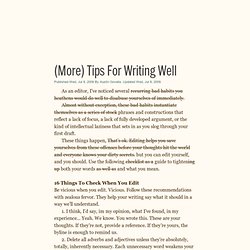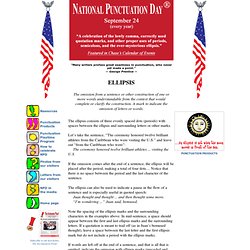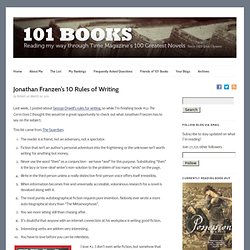

50 Problem Words and Phrases. Life Habits to Improve Your Writing. 7 Reasons Your Writing Dreams Aren’t Coming True. (More) tips for writing well (Austin Govella at Thinking and Making) Published Wed, Jul 8, 2009 by Austin Govella.

Updated Wed, Jul 8, 2009. As an editor, I’ve noticed several recurring bad habits you heathens would do well to disabuse yourselves of immediately. Almost without exception, these bad habits instantiate themselves as a series of stock phrases and constructions that reflect a lack of focus, a lack of fully developed argument, or the kind of intellectual laziness that sets in as you slog through your first draft.
These things happen, That’s ok. Editing helps you save yourselves from these offenses before your thoughts hit the world and everyone knows your dirty secrets. but you can edit yourself, and you should. 16 things to check when you edit. The Ellipsis. “Many writers profess great exactness in punctuation, who never yet made a point.” — George Prentice — The omission from a sentence or other construction of one or more words understandable from the context that would complete or clarify the construction.

A mark to indicate the omission of letters or words. The ellipsis consists of three evenly spaced dots (periods) with spaces between the ellipsis and surrounding letters or other marks. Let’s take the sentence, “The ceremony honored twelve brilliant athletes from the Caribbean who were visiting the U.S.” and leave out “from the Caribbean who were”:The ceremony honored twelve brilliant athletes ... visiting the U.S. If the omission comes after the end of a sentence, the ellipsis will be placed after the period, making a total of four dots.... The ellipsis can also be used to indicate a pause in the flow of a sentence and is especially useful in quoted speech:Juan thought and thought ... and then thought some more.
Eight Secrets Which Writers Won’t Tell You. Image from Flickr by Lazurite This is not particularly relevant to the post, but I’m getting an awful lot of comments telling me, often a little snarkily, “it’s ‘THAT’ not ‘WHICH’”.

25 Things Every Writer Should Know. An alternate title for this post might be, “Things I Think About Writing,” which is to say, these are random snidbits (snippets + tidbits) of beliefs I hold about what it takes to be a writer.

I hesitate to say that any of this is exactly Zen (oh how often we as a culture misuse the term “Zen” — like, “Whoa, that tapestry is so cool, it’s really Zen“), but it certainly favors a sharper, shorter style than the blathering wordsplosions I tend to rely on in my day-to-day writing posts. Anyway. Peruse these. Absorb them into your body.
Let your colonic flora digest them and feed them through your bloodstream to the little goblin-man that pilots you. Feel free to disagree with any of these; these are not immutable laws. Buckle up. 1. The Internet is 55% porn, and 45% writers. 2. A lot of writers try to skip over the basics and leap fully-formed out of their own head-wombs. 73 Ways to Become a Better Writer. 5 editor’s secrets to help you write like a pro. I do a lot of copyediting, both of books and advertising collateral.

I’ll let you in on a secret that still surprises me, although I’ve seen it hundreds of times now. If you looked at the raw work of most professional writers, you’d be pretty underwhelmed. Professional writers get work because they hit their deadlines, they stay on message, and they don’t throw too many tantrums. Some pros have a great writing voice or a superb style, but as often as not, that gets in the way.
When you know that the best word is “prescient,” it’s hard to swallow when an account manager tells you the client won’t know what it means. Professional writers rely on editors to fix their clunks. Editing, like writing, takes time to learn. Jonathan Franzen’s 10 Rules of Writing. Last week, I posted about George Orwell’s rules for writing, so while I’m finishing book #12: The Corrections I thought this would be a great opportunity to check out what Jonathan Franzen has to say on the subject.

This list came from The Guardian: The reader is a friend, not an adversary, not a spectator.Fiction that isn’t an author’s personal adventure into the frightening or the unknown isn’t worth writing for anything but money.Never use the word “then” as a conjunction– we have “and” for this purpose. Substituting “then” is the lazy or tone-deaf writer’s non-solution to the problem of too many “ands” on the page.Write in the third person unless a really distinctive first-person voice offers itself irresistibly.When information becomes free and universally accessible, voluminous research for a novel is devalued along with it.The most purely autobiographical fiction requires pure invention. 40 Lessons Learned in Ten Years as a Freelance Writer.